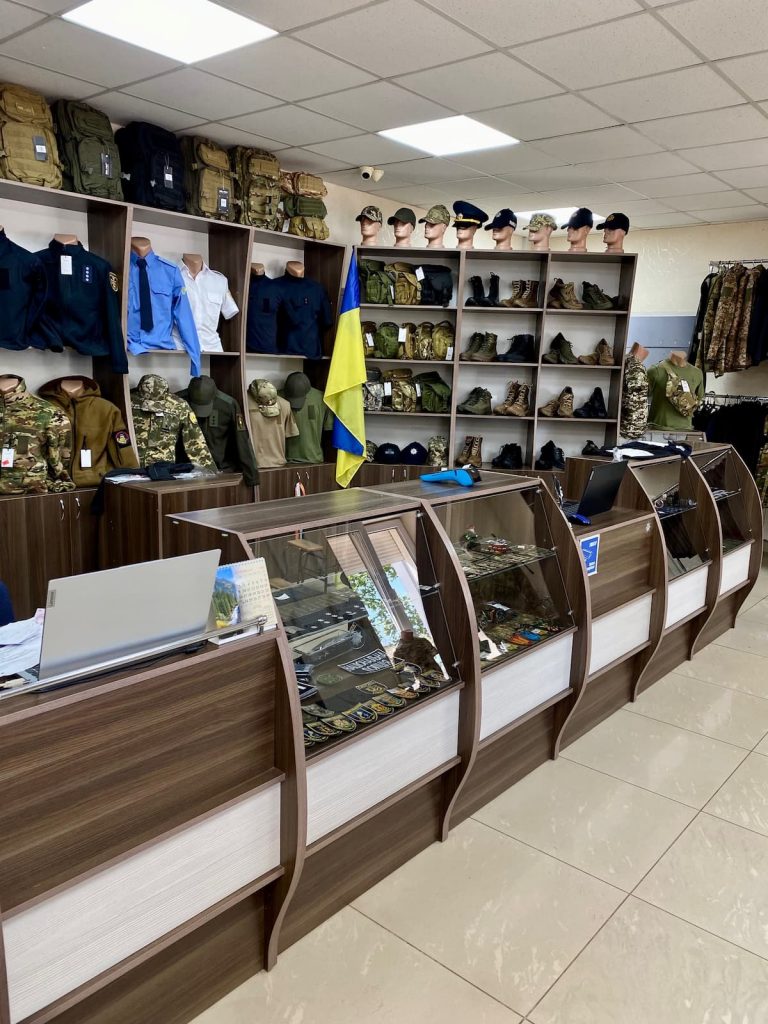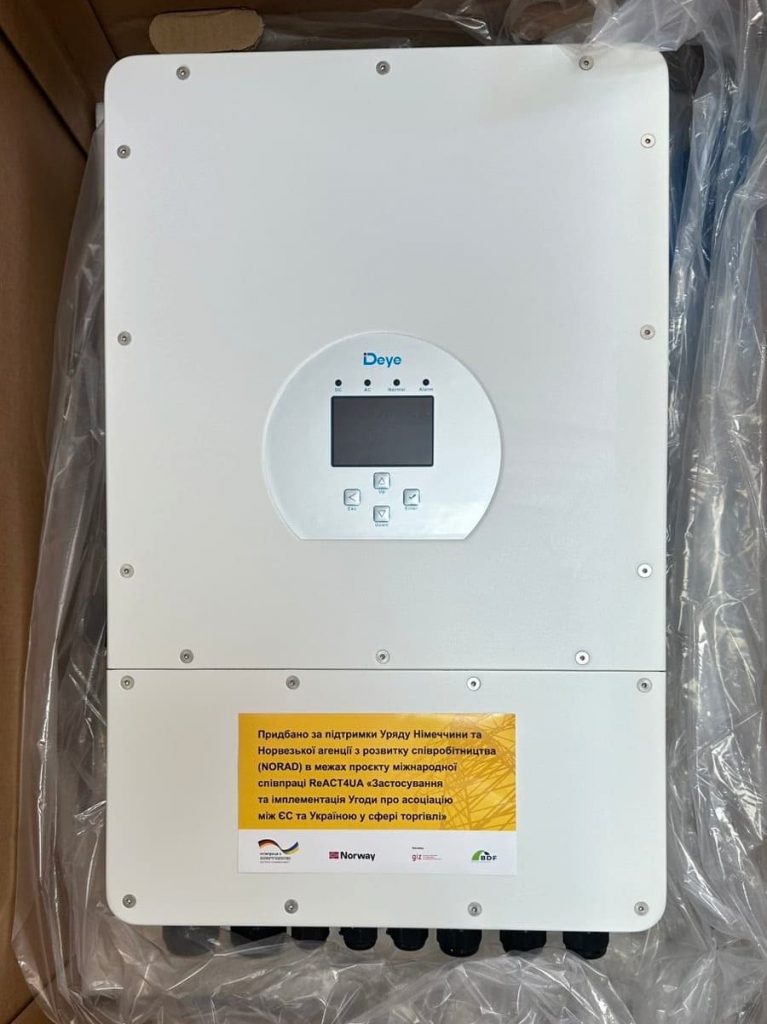
- About BDF
- Programs
- To banks
- For enterprises
- News BDF
- Public information
- Home
- Success stories
- Solar Solution for Stable Work: the Story of a Tailoring Shop from Kryvyi Rih
Solar Solution for Stable Work: the Story of a Tailoring Shop from Kryvyi Rih
In 1999, Tetiana Krasnodid’s father founded a small tailoring shop in Kryvyi Rih. Later, the family business was continued by his daughter – a professional seamstress who not only manages the business but still picks up chalk and scissors when needed. The “Tanak” atelier specializes in custom tailoring of uniforms for police officers, rescuers, railway workers, military personnel, and other service workers. They know exactly where and at what angle shoulder straps should be sewn, what height – chevrons, and how tactical uniforms differ from ceremonial ones.
“We don’t do mass production, we don’t take part in tenders. Clients come to us – and we individually sew uniforms to their order. We do everything ourselves: shoulder straps, chevrons, patches – according to regulations, laws. Sometimes we know more than the client,” says Tetiana.
Despite the full-scale war, the atelier team grew to nine people, opened a physical store, and set up nationwide sales via social media. But the growth came with serious challenges.
Demand grew, but resources disappeared
From the first days of the full-scale invasion, demand for uniforms and tactical clothing surged several times over. The atelier actively supported regular clients, searched for fabrics.
“In 2022, everyone started massively sewing covers for body armor, even from unsuitable fabrics. We tried to warn them: ordinary fabric burns, melts. Sewing from it – means risking lives,” the owner recalls.
At the same time, prices rose, logistics broke down, Kyiv was blocked, and suppliers from Kharkiv had evacuated. In critical weeks, the business had nothing to sew from and then physically couldn’t process the volume of orders.
“It’s not just that we didn’t have materials, we physically couldn’t produce the needed quantity. And when blackouts started – it became nearly impossible. We adapted however we could, but still lacked resources,” shares Tetiana.
When the lights go out – determination turns on
At first, the atelier avoided power outages, but in 2023–2024, the schedules worsened. Often, they couldn’t work a full day.
“We’re a team of women. The generator has a heavy smell, needs refueling, oiling. Plus, it damages the clothes. So, we needed another solution – no fuel and soot,” explains the entrepreneur.
To blackout challenges was added another problem – high electricity bills during the heating season, as the premises are heated with an electric boiler. “January and February are always the weakest months in terms of profit. But you still have to pay the bills. And you realize: you’re working not for growth, but just to cover utilities,” says Tetiana.
That’s why the decision to apply for the first component of the grant project “Support for Energy Resilience of Micro and Small Enterprises in Ukraine” became logical and timely for “Tanak.”
Solar solution for stability
Thanks to the grant received, the atelier bought a modern solar-based system: a 12 kW inverter, 14 panels, and a 5 kW battery system. After installation, the system is expected to partially cover energy production during summer and mid-season periods.
“I haven’t yet calculated exactly how much I’ll save. But for me, it’s crucial to work without interruptions and be less dependent on conditions. Even if it covers only part of the costs – it’s already a big relief,” says Tetiana.
All equipment was purchased from a local contractor in Kryvyi Rih so that specialists could quickly arrive if setup or repairs were needed. “The guys explained: the system can be scaled – more panels, more batteries. Right now it doesn’t cover all our needs, but in summer it will almost fully run. And that’s already a huge step forward.”


Energy for growth
Installing the solar energy system – for “Tanak” – is not just about stability. It’s about new opportunities. Saved funds will allow investment in other areas: expanding staff, updating equipment, strengthening brand presence. “We’ve already received an embroidery machine. And now we’re looking for a person to operate it. That’s one more job opportunity,” shares Tetiana.
The “Tanak” brand is also undergoing legal registration as a trademark. After years of work, they not only sew according to requirements – but develop their own solutions. For example, they adapt uniforms for pregnant military servicewomen or create more comfortable polos and tunics for train conductors and service workers.
“War is war, but our clients still want to be feminine. Of course, if a girl is in field conditions, she can`t wear a skirt. But we can sew something else from fabric that stretches better or breathes more,” says the entrepreneur.
External support – she says – is not just about money. It’s a signal: your work matters and is worth investing in. “Small businesses usually get left on their own. But here you feel: your work matters to someone. A grant is not just equipment. It’s also psychological support.”
This publication was prepared within the support of the international cooperation project “Energy resilience support for micro and small enterprises in Ukraine” under the ReACT4UA Program (Utilization and Implementation of the Association Agreement between the EU and Ukraine in the field of Trade) that is co-funded by the German Government and the Norwegian Agency for Development Cooperation (NORAD). It is implemented by the German federal company “Deutsche Gesellschaft für Internationale Zusammenarbeit (GIZ) GmbH”.
The project aims to increase the resilience of the Ukrainian economy to recurrent power outages and assure business continuity of Micro, Small and Medium Enterprises (MSMEs) by financially supporting solutions for an uniterrupted access to electricity.
The content of this publication is the sole responsibility of the Business Development Fund and does not necessarily reflect the views of the Government of Germany, NORAD, or GIZ.